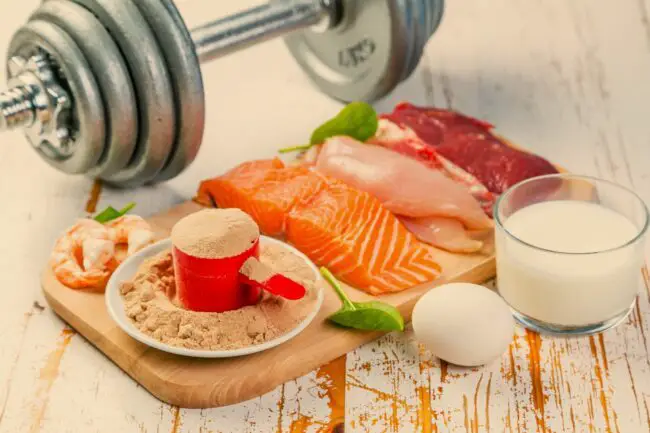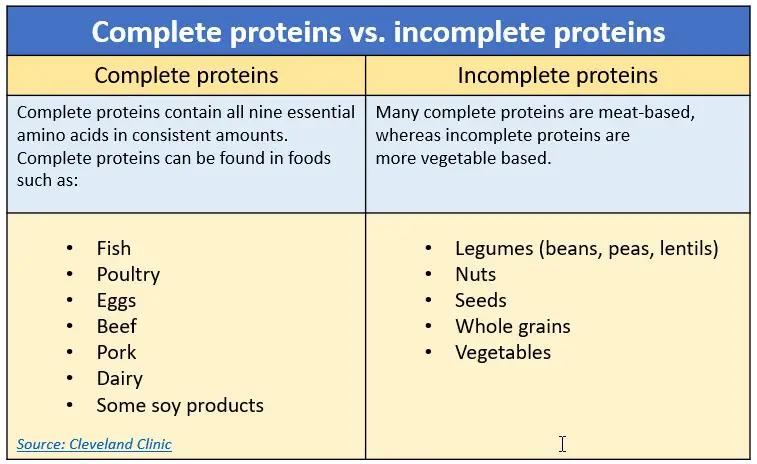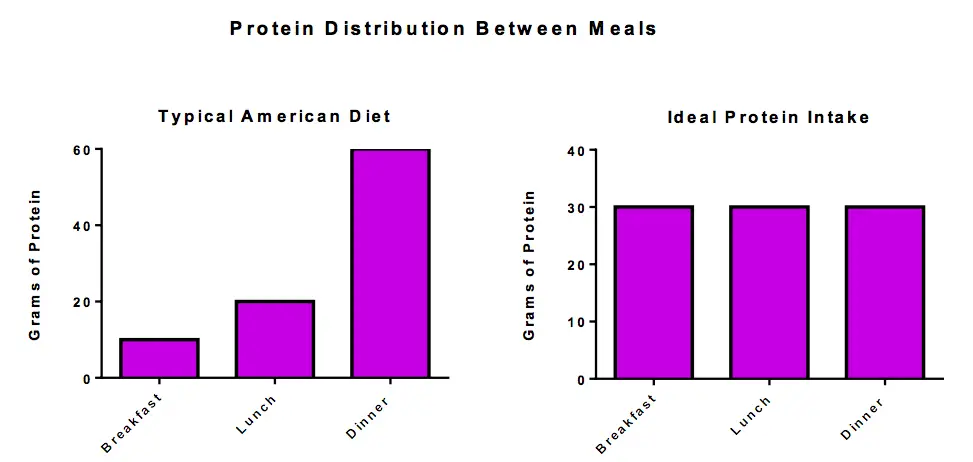
Selection of animal origin protein sources with powder protein, copy spaceEveryone knows that you need protein in your diet. it’s even more important as we age. There is a natural aging process called sarcopenia, which is the loss of muscle mass. By the time women near 80 years, the Mayo Clinic observes, they may have lost as much as half of their skeletal muscle mass. Eating enough protein reduces the impact of that muscle wasting.
“Your protein needs depend on how much you weigh,” the Clinic adds. “For women over 50, experts recommend 1 to 1.5 grams of protein per kilogram of weight (1 kilogram = 2.2 pounds). If you weigh 140 pounds, for instance, you would need at least 63 grams of protein a day.”
Are you getting your protein at the right time of day?
But did you know that when you get your protein is vitally important too? Because of the way the body dispenses energy and rebuilds cells and muscle, the protein you eat for breakfast performs a very different role from proteins you eat for dinner. Are you getting the right amount of protein at the right time? Let’s explore.
Your body needs protein when you wake up
For starters, when you wake up, your body needs protein because your muscles have been breaking it down as you were sleeping, according to research from McMaster University, Canada. “You want 30 grams at breakfast,” says researcher Stuart Phillips.
Jessica Crandall, a registered dietitian and a spokeswoman for the Academy of Nutrition and Dietetics, agrees: “The most common mistake we make is not enough protein at breakfast”. According to Crandall, adults need 20-30 grams of protein in the morning, which varies by gender and how active you are, to keep up our muscle mass and metabolism.
Protein for breakfast fuels your brain for optimal performance
Protein provides the amino acids our brains need to function optimally. A high protein breakfast raises the levels of tyrosine in the brain, one of the 20 standard amino acids cells need to synthesize protein. This helps the brain produce two neurotransmitters, norepinephrine and dopamine, which boast our energy and make us feel awake and alert.
Eating a breakfast rich in protein can also help you feel a sustained sense of fullness until later in the day. Researchers from the University of Missouri used MRI scans to compare the brain activity of participants who had eaten high-protein breakfasts to ones that had either skipped breakfast or had eaten breakfasts with moderate protein. By lunchtime those who had skipped breakfast were the hungriest. MRI scans on participants who had eaten the high-protein breakfast showed less brain activity in regions that control food motivation, or hunger, than those who ate cereal for breakfast.
If you eat a high-protein breakfast, your brain will have all of the neurotransmitters you need to help your entire body function properly. Two amino acids that act as neurotransmitters, glutamate and aspartate, come from protein. You also need several others, including tyrosine, tryptophan and phenylalanine, to produce the neurotransmitters norepinephrine, serotonin and dopamine.
Aim for complete proteins (but what are they?)
Proteins are essentially a chain of amino acids, organic compounds that your body uses to make proteins.
There are 20 different amino acids your body needs, as explained in the Cleveland Clinic’s Health Essentials newsletter. Altogether, they play a big role in your body’s immune system; support muscle growth, tissue regeneration and energy production; and regulate your mood, appetite and sleep.
Eleven of the 20 amino acids our bodies need are actually produced by your body all by itself, so we don’t need to worry about getting them from our diet. The other nine—the essential amino acids—we get through food.
A food is considered a complete protein when it contains all nine essential amino acids that our body can’t produce on its own. By comparison, incomplete proteins contain some, but not all, of the essential amino acids, and in various amounts.

For instance, while eating incomplete proteins, such as wheat toast or peanut butter alone, will give you some of the amino acids you need, eating wheat toast with peanut butter can give you all of them, according to the Missouri Department of Health and Senior Services.
The takeaway: a high protein breakfast builds muscle, supports weight loss, supplies energy, and promotes brain health
To wrap it up, writes Aubrey Hawley for the American Nutrition Association, “A high protein breakfast has been shown to benefit muscle health and to support weight loss by increasing muscle mass, energy expenditure (calories burned), satiety hormones, glucose regulation and by decreasing the desire to snack at night. High protein breakfasts have also been shown to improve the body’s response to a high carbohydrate food up to four hours after the breakfast meal.”
And those of us over 60 actually need more protein than when we were younger. Why? Our aging bodies process protein less efficiently and need more of it to maintain muscle mass and strength, bone health, and other essential physiological functions.
How much protein do I need?
To get a general idea, a 150-pound (68 kilo) woman needs about 68 grams of protein a day. Experts recommend that older adults increase their protein intake to 1-1.2 grams of protein per kilo of body weight. Since a 150-pound woman is equivalent to 68 kilos, she needs 1-1.2 grams of protein per kilo or 68 grams of protein a day. You can calculate your weight in kilos here. Then multiply it by 1-1.2 grams of protein to calculate your recommended daily protein requirement.
Let’s assume that your daily recommended requirement is 68 grams of protein. You’re probably thinking, no sweat. I can have a buttery croissant for breakfast with jam and coffee. For lunch, I can have 2/3 of a cup of quinoa salad (12 grams of protein) and a 1/3 of a cup of hummus (7 grams of protein) with some crudités. Then I’ll have a grilled six-ounce sirloin steak for supper (52 grams of protein) with some French fries. At 71 grams of protein, that exceeds my daily requirement.
Aim for at least 20g in the morning
Uh, not so fast. It also matters when you get your protein.
Good morning, protein.

Chart adapted from Paddon-Jones and Rasmussen, 2009.
If you followed the schedule for eating protein just described, your diet would resemble the chart on the left. While you ate enough protein, your timing would be off.
The ideal timing for eating protein is closer to the chart on the right: your protein for the day is divided equally between three meals. This means that you need to increase the amount of protein you eat at breakfast–the meal when most of us tend to eat the least protein.
Eating protein before sleep may help preserve muscle mass and strength in the elderly, especially when combined with physical activity, such as resistance-type training.
But 20 mg or more of protein at breakfast fuels the brain, supports rebuilding muscle mass, suppresses hunger, and provides energy throughout the day.
I don’t have time for breakfast. What about protein shakes?
Protein shakes are for young people on the go.
That’s why they were invented.
But they are not a good substitute for breakfast protein. And they are not recommended for aging bodies. Grabbing a protein shake once in a while won’t hurt you. But no protein powder in the world can substitute for the protein and nutrients that are abundant in whole, real food.
* * *
You may also like
Go to the Blue Hare homepage for more articles for fabulous women.
